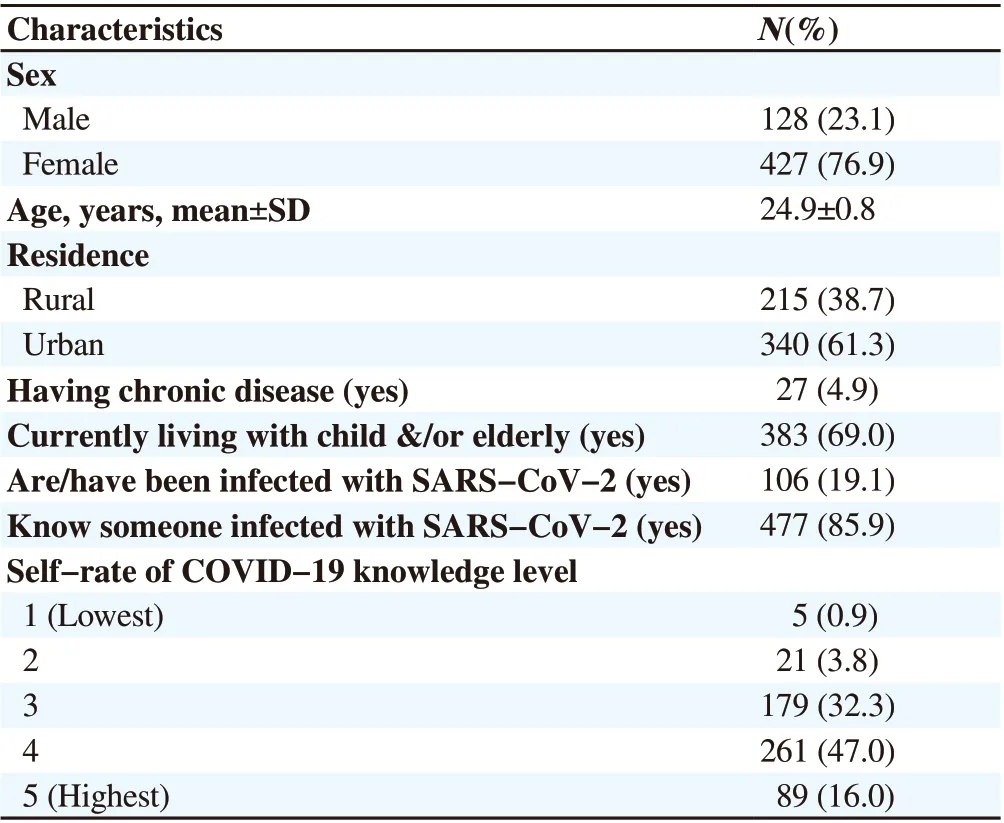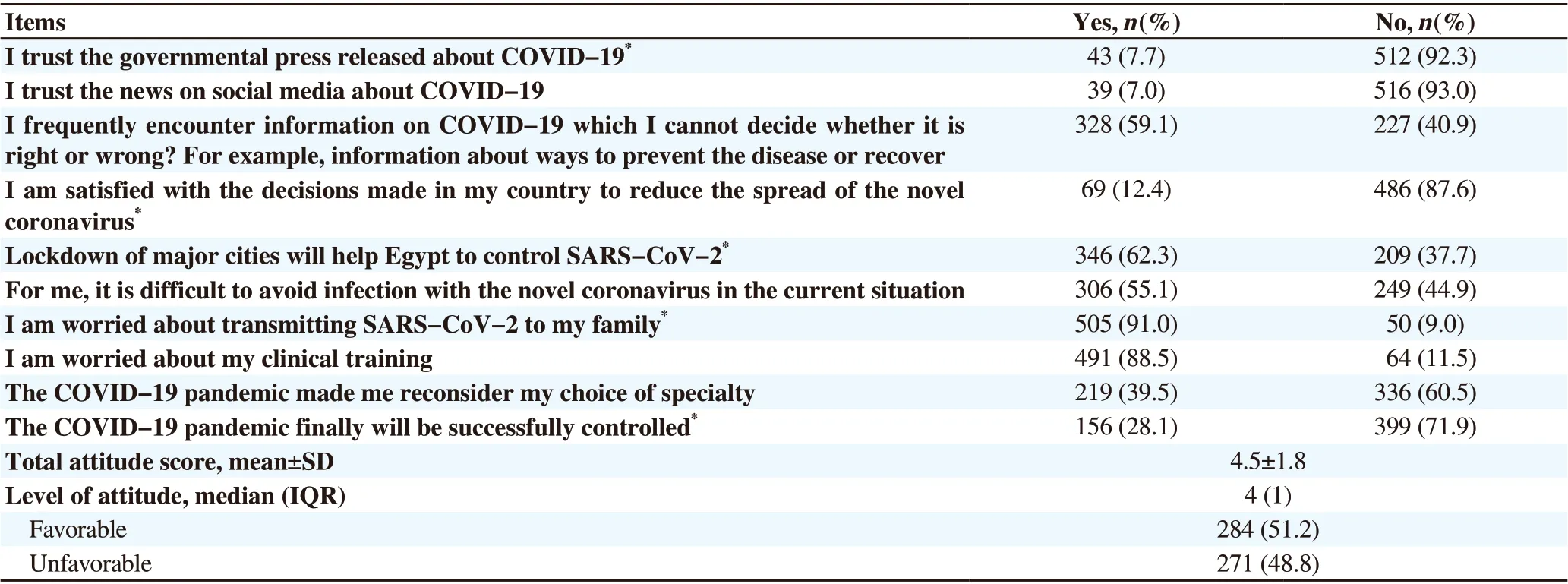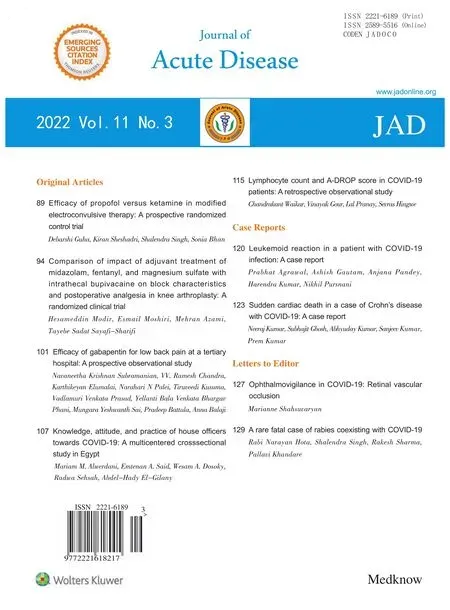Knowledge, attitude, and practice of house officers towards COVID-19: A multicentered crosssectional study in Egypt
Mariam M. Alwerdani, Emtenan A. Said, Wesam A. Dosoky, Radwa Sehsah, Abdel-Hady El-Gilany
1Mansoura University Hospitals, Faculty of Medicine, Mansoura University, Mansoura, Egypt
2Benha University Hospitals, Faculty of Medicine, Benha University, Benha, Egypt
3Occupational Health and Industrial Medicine, Faculty of Medicine, Mansoura University, Mansoura, Egypt
4Public Health, Faculty of Medicine, Mansoura University, Mansoura, Egypt
ABSTRACT
KEYWORDS: COVID-19; House officers; Knowledge; Attitude;Practice
1. Introduction
Coronavirus disease 2019 (COVID-19) is an acute respiratory disease caused by SARS-CoV-2[1]. Patients with COVID-19 may be asymptomatic or with mild symptoms like fever, dry cough,malaise, or some gastrointestinal symptoms like nausea, vomiting,and diarrhea. Some patients experienced a severe form of the disease in the form of symptoms of hypercoagulability dyspnea,respiratory failure, and pneumonia[2].
On 30th January 2020, the World Health Organization (WHO)declared the outbreak of COVID-19 to be a public health emergency of international concern. Eventually, on March 11th, 2020, WHO officially announced that COVID-19 is a pandemic[3].
Although most house officers are not at the forefront in fighting COVID-19, they are still at a high risk of SARS-CoV-2 infection.Given that the job duties of house officers usually include doing the primary assessment of patients, there is a high probability of contact with undiagnosed COVID-19 cases without appropriate personal protective equipment, which increases the risk of catching and transmitting the infection[4].
Moreover, house officers are considered a trusted source of healthrelated information in society, and they have a vital role in spreading accurate knowledge along with a favorable attitude towards the current pandemic. Therefore, house officers need to be equipped with the correct updated knowledge and committed to practicing effective protective measures against the COVID-19 pandemic[5].
To the best of the authors’ knowledge, there is scarce data about house officers’ knowledge, attitude, and practice (KAP) towards the current COVID-19 pandemic. Thus, this study aims to assess the KAP of the house officers toward COVID-19 and its associated factors.
2. Participants and methods
2.1. Study design
This observational crosssectional study was conducted from August 1st to December 31st, 2020.
2.2. Ethical consideration
The proposal of the current study was approved by the Institutional Research Board, Faculty of Medicine, Mansoura University(Reference number R.20.06.903). Additionally, questionnaires were filled anonymously, and informed consent was obtained from each participant in the study after ensuring confidentiality. Participants could respond in their own time and privacy.
2.3. Study population
This study targeted Egyptian house officers enrolled in universities and hospitals between 2020-2021. Participants should be currently working in a university hospital and not on any type of leave.
2.4. Study instrument
Data were collected using an anonymous four-sectioned selfadministered questionnaire in English. The questionnaire was structured after an extensive literature review to collect relevant data about COVID-19[6-8]. It included PartⅠ: Personal data (age,gender, university, residency); Part Ⅱ: Knowledge (questions about knowledge of symptoms of COVID-19, its mode of transmission,and protective measures); Part Ⅲ: Attitude (questions about the attitude towards the current pandemic, the national response to it,and the effect of the pandemic on specialty choice); Part Ⅳ: Practice(questions about practicing the protective measures during clinical practice).
2.5. Data collection approach
The questionnaire was designed on the Google forms platform and delivered via an online link through the official Facebook group of house officers enrolled in the Egyptian foundation year program 2020-2021. All completed forms were analyzed.
2.6. Statistical analysis
According to the official records, the total number of house officers in 2020-2021 was 10 000. A representative sample of house officers was calculated using Open Epi, Version 3 (https://www.openepi.com/Menu/OE_Menu.htm) where: population size (N)=10 000,hypothesized frequency of good knowledge and favorable attitude towards COVID-19 pandemic in the population is 50%[6,7], 5%precision, design effect=1.5, and confidence level=95%. The estimated sample size was at least 555 house officers.
Data were coded and statistically analyzed using the Statistical Package for Social Sciences program (SPSS v25) for Windows.For knowledge, attitude, and practice questions, each answer was scored as follows: correct knowledge/favorable attitude/practice=1,not correct knowledge/unfavorable attitude/practice answer=0(Questions with reversed scores were considered). Since the data were non-parametric, the median was used as a cut-off value in KAP. A Chi-square test was used to analyze factors related to good KAP. P-value equal to or less than 0.05 was considered statistically significant.
3. Results
Participants were affiliated to 10 different university hospitals in Egypt. More than half of the participants were females from urban areas (76.9%). Most house officers (85.9%) knew someone with SARS-CoV-2 infection, and 19.1% of them had been infected with SARS-CoV-2 (Table 1).Knowledge of house officers about COVID-19 is presented in Table 2. The mean overall knowledge level among the participants was 17.28±2.00. About half of the participants (46.1%) had good knowledge about COVID-19 symptoms, incubation period, and protective measures. One of the frequent misbelieves was that zinc and vitamin C are effective protective treatments against COVID-19.

Table 1. Participants characteristics.

Table 2. Knowledge of house officers towards COVID-19 (n=555).

Table 3. Attitude of house officers towards COVID-19 (n=555).
Table 3 outlines the percentage and frequency of favorable attitudes among participants. About half (51%) of house officers had a favorable attitude towards the pandemic. Most of them were worried about their clinical training and the possibility of transmitting the SARS-CoV-2 infection to their families (88.5%and 91.5%, respectively). Notably, about 87.6% of house officers were not satisfied with the governmental decisions to control the pandemic, and more than half of them were confused about the accuracy of pandemic-related information.
Most of the house officers (82.5%) were committed to practicing the recommended preventive measures for COVID-19. Nevertheless, about half of them were not familiar with thehelpline number to contact in case of suspecting SARS-CoV-2 infection (Table 4).

Table 4. Practice of house officers towards COVID-19 (n=555).

Table 5. Factors associated with good knowledge, attitude, and practice towards COVID-19 among house officers (n=555).
Analysis of good KAP-associated factors is presented in Table 5.The percentages of good knowledge and practice among those with chronic diseases or those who knew someone infected with SARS-CoV-2 were higher, but the differences were not statistically significant (P>0.05). In addition, the percentages of females with the good practice were higher than those of males, with no statistical difference (P>0.05). Furthermore, other demographic characters failed to show statistically significant differences in KAP.
4. Discussion
To the best of my knowledge, this study is one of the earliest to evaluate the KAP of house officers all over Egypt during the current COVID-19 pandemic. Notably, good knowledge yields a positive attitude and results in an appropriate practice, which reflects the importance of knowledge, especially for health care workers (HCWs) including house officers/medical interns. The present study showed adequate knowledge in 46.1% of participants,favorable attitude in 51.2%, and good practice in 82.5%.
Regarding knowledge, 46.1% of medical interns showed good knowledge, which emphasizes a knowledge gap between present evidence and their level of knowledge. This is lower than other studies conducted in Ethiopia and India (88.2% and 82.9%,respectively)[8,9].
On the other hand, it is higher if compared to the findings of Alnohair et al.[10]. in which the proportion of good knowledge among medical interns was 38%. These differences could be attributed to many factors including time of the study, received training, age, and medical degree of HCWs[11,12]. Generally, this percent shows the presence of misbeliefs and non-authenticated sources of information at that time of the newly emerging pandemic[13].
In terms of COVID-19 symptoms, nearly all interns were able to identify common presentations as cough, shortness of breath, or being asymptomatic. This result is same with previous literature[12,14,15]. In addition, a high proportion of participants(>90%) were able to recognize other symptoms such as loss of taste and smell, headache, and gastrointestinal symptoms, which is higher than proportions reported by other studies in Saudi Arabia and Uganda (64.8%, 53%; respectively)[10,16]. A considerable percentage of house officers (≈40%) were not able to identify less common symptoms (runny nose and blushed face) as symptoms of SARS-CoV-2 infection, in contrast to the results (80.5% and 77.7%, respectively) of other studies[12,17]. This can be attributed to the fact that these presentations are not known to accompany a respiratory disease; however, COVID-19 has been proven to have multisystem involvement[18].
COVID-19 mode of spread was recognized by most medical interns which are in agreement with some literature[12,14,19]. On the contrary, only 41.1% of house officers answered correctly that eating or contacting wild animals would not result in the infection by the SARS-CoV-2. This is similar to what is reported by Olum et al.[16]. This belief could be explained by the fact that early reported cases have been linked to eating wild animals[20]. Nevertheless,the Center for Disease Control stated that until now there is no evidence that animals can spread the SARS-CoV-2 causing COVID-19[21].
The myth that the pandemic may end in summer as the virus is sensitive to heat and humidity was not a dominant thought within the Egyptian medical interns. This is similar to other studies in India and Ethiopia[8,9], and can be explained by the fact that the summit of the crisis in these countries has already occurred in summer[22].
The present study shows variable knowledge levels about methods of COVID-19 prevention. While most of the respondents(96.4%) believed that masks protect other people in case you are the infected one, 89.7% of them wrongly thought that masks substitute social distancing. This is in coincidence with the findings of Ayinde et al.[23] in Nigeria. Additionally, a high proportion of participants agreed with the efficacy of isolation in the reduction of virus spread, either the isolation of the infected people or their contacts. This is in line with many other studies[8,17,19], and can be explained by the obvious fact that COVID-19 is a communicable disease transmitted from person to person[24].
Regarding the prophylactic treatment against COVID-19, the majority of house officers believed that vitamins and supplements play a role in contain SARS-CoV-2 infection; however, CDC declared no protective role of both against COVID-19[25].More than half of the participants (55%) wrongly thought that azithromycin is effective in prophylaxis against SARS-CoV-2 infection, which is a slightly higher percentage than that of Hussain et al.[19]. It should be noted that recent evidence has warned against the use of hydroxychloroquine with azithromycin to treat COVID-19 due to the arrhythmogenic potential of these drugs[26].Besides, 74.6% of respondents knew that hydroxychloroquine is no prophylaxis against COVID-19. This can be referred to as the messy use and prescription or over-the-counter drugs and/or other drugs, not only among the public but also among HCWs[27]. It is worthy to mention that until the study time no specific drugs are proven to be effective in prophylaxis and treatment of COVID-19[28].
Nearly half of medical house officers showed a negative attitude towards the COVID-19 pandemic. During this global stressful era, HCWs has been experiencing psychological disturbances along with serious worries about themselves, their families, and their career[29,30]. In the current study, 59.1% of Egyptian interns showed great concerns about the accuracy and correctness of information they are receiving, and only 7.7% of them trusted the governmental press information about the COVID-19 pandemic.This is similar to another study that highlighted the confidence crisis and emphasizes the need for reliable trusted sources of information[31]. It is worth mentioning that COVID-19 is a newly emerging disease striking the whole world with a lack of enough information about prevention or cure[13].
About 7% of house officers trusted social media as a source of pandemic-related information. This is contradictory to a previous study in Egypt which showed that 80.8% of the public rely on social media platforms as sources of information[32]. Other studies on HCWs reported high dependence on social media as a source of information[9,14]. This discrepancy can be explained by numerous factors including the easy spread of rumors and fake news through social medical, which is an uncontrolled open platform for anyone to write anything[33,34]. To our surprise, a study conducted in Vietnam showed a significant correlation between dependence on social media news and good COVID19-related knowledge[6].One of the main stressors among house officers, in the current study, is the fear of transmitting the infection to their families which goes in line with many other studies[12,31]. The nature of their training environment makes them at high risk of being infected or transmitting the infection to their family members either by being infected, asymptomatic carrier, or by exposing them to contaminated objects[14]. A study conducted in Pakistan stated that HCWs living with a family are practicing more properly because of the sense of responsibility and fearful attitude to transmit the infection to their beloved[14]. HCWs have been facing other stressors such as social stigma, shortage of needed personal protective equipment, overloaded healthcare facilities, and services-induced public[31,35].
The foundation year is the main year of training through which house officers engage in practical life. About 90% of respondents had worries about their clinical training, which is in agreement with a previous study[14]. This is caused by the reduced training opportunities due to quarantine measures along with specifying many hospitals for isolation of COVID-19 cases. Similarly, an Australian study has shown that the pandemic affected specialty training[36]. However, the long-term impact of the pandemic is not obvious as only 39.5% of respondents have decided to reconsider the choice of their future specialty.
The majority of respondents (62.3%) have a positive attitude toward locking cities to control the pandemic, which is in agreement with other studies[8,12]. On the contrary, only 12.4% of house officers are satisfied with the decisions made by the country to control the spread of COVID-19, and only 28.1% think the pandemic will be controlled, which is similar to other studies[8,32].Nevertheless, a previous study, conducted in India, showed that 78% of HCWs believed that “India will win the battle”[11]. Also,an early optimistic attitude that China will gain victory was predominated[37]. Other studies have shown similar results[12,17].This indicates the need for better communication and assurance from various authorities. However, some of the populations that show confidence have previously faced and conquered similar conditions as a severe acute respiratory syndrome (SARS) in China[38].
There is no doubt that sound practice greatly benefits in controlling the pandemic. This study shows that 82.5% of the participants have good practice. As regards adherence to preventive measures, nearly all respondents practice washing hands more frequently than any previous time similar to findings presented in other studies[9,10,23]. This is logical as hand hygiene is the most important measure to reduce germs transmission[25].Other precautionary measures are taken by the vast majority of respondents who maintain social distancing and avoid unnecessary outings and travel. This agrees with previous studies[10,17,39].Notably, only 43.4% of interns have written down any helpline number to inform about COVID-19 cases. Reasons for that may be because they prefer going to healthcare facilities more than informing about cases by phone.
Bivariate analysis of factors associated with good knowledge,attitude, and practice among medical house officers showed that,surprisingly, there is no significant relation between KAP and chronic disease, living with people with comorbidities, being infected, or knowing an infected person. This contradicts what is interpreted by Jawed et al.[14]. who have found that HCWs living with a family showed better practice.
The current study is the earliest to assess KAP among Egyptian house officers at the peak of this global emerging crisis. However,the limitations of the present study include the nature of the crosssectional study design which gathers information at a certain point in time, without the study of cause-and-effect association. In addition, although online data collection was the most appropriate during the lockdown, it has some innate limitations. Inability to recruit a representative random sample as only those who happen to be online and did not ignore the invitation appeared in the sample.
In conclusion, a good percentage of Egyptian house officers have good knowledge and attitude towards the COVID-19. In addition,a high percentage has good practice during the current pandemic.Being aware of gaps in knowledge, attitude and practice can help to effectively take measures that aid to handle the condition. Based on the results of the current study, the authors recommend good communication of governments and hospitals’ administration with HCWs to provide authenticated data information. Also, providing training and mental health programs to support HCWs at this difficult time, along with providing HCWs with adequate necessary PPE to assure personal protection. This in turn relieves stress and fear, thus leading to better results in patients’ care. Substitution of traditional training by online virtual sessions to compensate for the lost training opportunities.
Conflict of interest statement
The authors report no conflict of interest.
AcknowledgmentsAuthors would like to thank the following house officers for their help in data collection; Ahmed Maher Khalil, Aya Ali Ziada, Esraa Monir Lotfi, Fatima Elsayed Abd El-Hafez, Fatma Ashraf Aboelizeed, Hala Adel Abdelsalam, Hassnaa Mohamed Ismail, Hebatullah Hassan.Rozza, Linah Mohamed Hassanein, Mirhan Ashour Elgabaressy, Nada Awies Beibars, Ola abdelkhalek Mohamed, Omnia Tarek Elweza,Riham Adel Gabr, Sarah Taha Salama and Somaia Abdallah Aboali.
Authors’ contributions
M.M.A. participated in study design formulation, collection, and analysis of data, and drafting of the manuscript. E.A.S. and W.A.D.collected the data and participated in drafting the manuscript. R.S.:participated in study design and performed revision and finalization of the manuscript. A.E. supervised study design, and analysis of data and performed critical revision and decision on the final manuscript.
 Journal of Acute Disease2022年3期
Journal of Acute Disease2022年3期
- Journal of Acute Disease的其它文章
- Efficacy of gabapentin for low back pain at a tertiary hospital: A prospective observational study
- Leukemoid reaction in a patient with COVID-19 infection: A case report
- Sudden cardiac death in a case of Crohn's disease with COVID-19: A case report
- Efficacy of propofol versus ketamine in modified electroconvulsive therapy: A prospective randomized control trial
- Comparison of impact of adjuvant treatment of midazolam, fentanyl, and magnesium sulfate with intrathecal bupivacaine on block characteristics and postoperative analgesia in knee arthroplasty: A randomized clinical trial
- Lymphocyte count and A-DROP score in COVID-19 patients: A retrospective observational study
